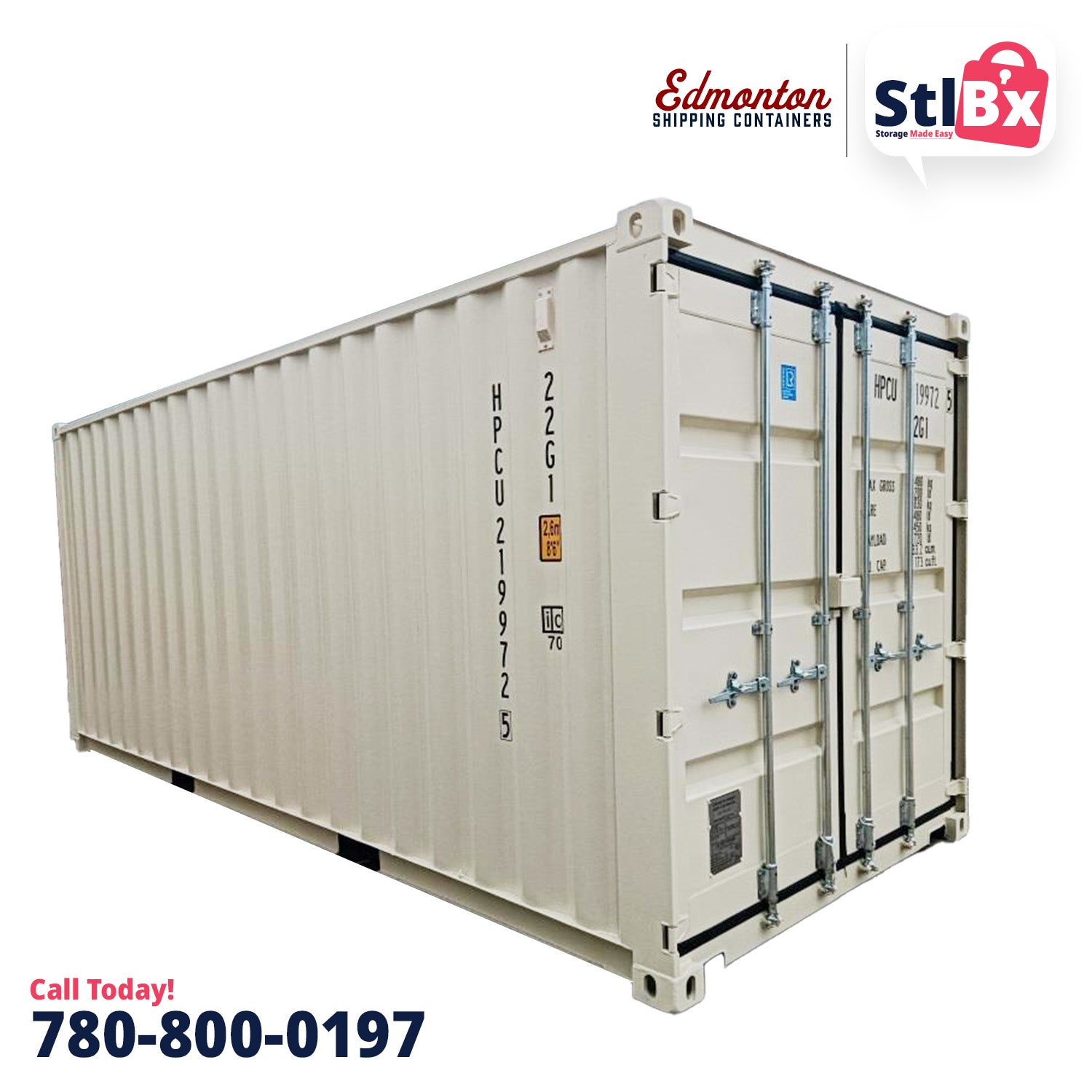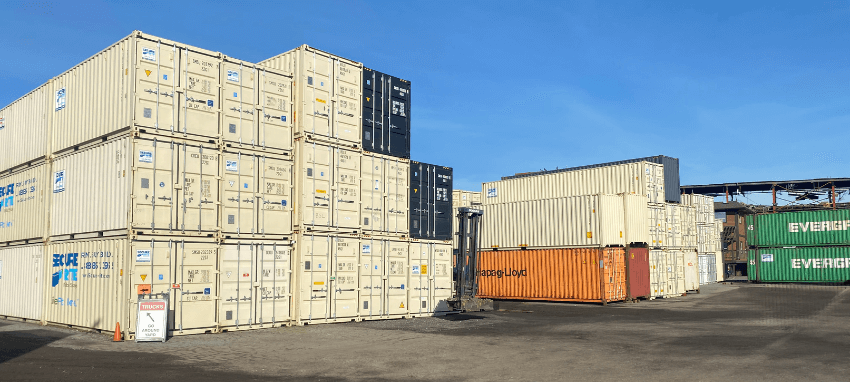Every little thing You Required to Find Out About Shipping Containers and Their Practical Applications
Shipping containers have actually evolved from mere devices for transportation to versatile structures with various functional applications. Their durable style and common sizing make them excellent for a variety of usages beyond delivery. From innovative real estate solutions to lasting farming, their adaptability is noteworthy. Yet, the possibilities do not end there. Discovering their different functions discloses shocking insights right into modern-day difficulties and creative options. What other roles could these containers play in today's globe?
The Design and Framework of Shipping Containers

Internally, containers are made to make best use of space, usually featuring wooden or steel floor covering that can sustain significant weight. Air flow systems might be integrated to avoid wetness accumulation, which is critical for delicate cargo. Furthermore, strengthened edges enable for easy handling by forklifts and cranes, promoting smooth loading and dumping. This thoughtful design and structure contribute to the containers' versatility across various delivery and storage applications.
Benefits of Making Use Of Shipping Containers
While several transport techniques have their benefits, using delivery containers attracts attention because of their unrivaled versatility and efficiency. Shipping containers offer a standard size, making them simple to move and stack throughout numerous settings of transportation, consisting of ships, trains, and vehicles. This standardization reduces packing and unloading times, thereby raising general efficiency.
Furthermore, shipping containers are constructed from sturdy products, offering robust security for products during transit. They are weather-resistant and safe and secure, minimizing the risk of damage from ecological aspects or burglary. Additionally, the modular style of delivery containers permits simple personalization, enabling services to adapt them for various functions, such as storage or mobile workplaces.
Their portability and cost-effectiveness make shipping containers an appealing choice for organizations looking to improve logistics and supply chain procedures. These advantages add to the growing appeal of shipping containers in various sectors.
Imaginative Housing Solutions With Shipping Containers
Ingenious real estate remedies have actually become an interesting application of shipping containers, leveraging their intrinsic strengths for domestic use. These flexible frameworks offer a sustainable alternative to conventional structure materials, frequently at a fraction of the cost. Designers and engineers have actually transformed containers into elegant, practical homes, accommodating diverse way of lives and preferences.

Shipping containers are environmentally friendly, advertising recycling and reducing waste. Several tasks focus on power performance, incorporating photovoltaic panels and green roofing systems. As urbanization boosts, these ingenious real estate options provide a useful action to real estate scarcities while fostering a special architectural aesthetic.
Shipping Containers in Retail and Pop-Up Shops
An expanding variety of sellers are turning to shipping containers as a vibrant remedy for retail rooms and pop-up shops. These versatile structures supply an affordable choice to typical shops, allowing businesses to create unique, captivating settings that draw in consumers. Their modular layout enables easy transportation and installation, making them ideal for short-term or seasonal retail locations.
Retailers can tailor shipping containers to mirror their brand identity, changing them into aesthetically appealing shops that attract attention in jampacked markets. The portable nature of containers also motivates effective use space, enabling for innovative formats that optimize client flow and involvement. Shipping containers can be situated in unique areas, such as uninhabited lots or urban parks, raising ease of access and foot web traffic.

As the retail landscape progresses, delivering try these out containers give a flexible and innovative solution that fulfills the needs of modern customers while improving the purchasing experience.
Sustainable Farming Practices Using Shipping Containers
Lasting farming practices progressively incorporate delivery containers as innovative remedies for farming - shipping containers for sale near me. These container ranches use hydroponics to make best use of room and source effectiveness, using a cost-efficient technique to food production. By transforming shipping containers right into agricultural hubs, farmers can address food security and ecological worries all at once
Container Farming Benefits
While typical farming deals with obstacles such as land deficiency and climate modification, container farming presents a sensible choice that maximizes space and sources. This ingenious method permits for year-round crop production in controlled atmospheres, lowering reliance on climate problems. Container farms make use of much less water than traditional farming, advertising sustainability and conservation. They can be established in urban areas, bringing fresh fruit and vegetables closer to customers and reducing transport discharges. Furthermore, the modular nature of shipping containers makes it possible for scalability, allowing farmers to readjust operations based upon demand. Container farming likewise minimizes pesticide usage by creating a confined ecosystem, ultimately improving food safety and security. As city populations expand, container farming becomes a functional remedy to satisfy the raising demand for local, lasting food sources.
Hydroponics in Containers
Hydroponics, which permits plants to expand without soil by utilizing nutrient-rich water, flourishes within the confines of delivery containers, making it a suitable approach for urban farming. These containers develop a controlled atmosphere that maximizes temperature, humidity, and light, making it possible for year-round cultivation. With restricted space in city areas, shipping containers use a scalable remedy for expanding fresh produce. Hydroponic systems within containers can include numerous strategies, such as nutrient movie technique (NFT) and deep water society (DWC), which optimize yield while lessening water usage. This innovative strategy not only boosts food security but also reduces the carbon footprint connected with conventional farming approaches. Hydroponics in containers stands for a forward-thinking service for sustainable urban food manufacturing.
Economical Agriculture Solutions
As food production deals with increasing challenges because of climate adjustment and urbanization, delivering containers arise as a cost-efficient service for agriculture. These versatile structures can be repurposed for numerous lasting farming methods, such as hydroponics and vertical farming. By making use of controlled atmospheres within containers, farmers can maximize development cycles and minimize resource consumption, consisting of water and plant foods. Furthermore, shipping containers can be purposefully put in metropolitan locations, decreasing transportation expenses and improving access to fresh fruit and vegetables. Their modular nature enables scalability, allowing farmers to increase operations as demand grows. Additionally, repurposing containers adds to throw away decrease, lining up with environmentally friendly agricultural initiatives. On the whole, delivering containers existing innovative possibilities for reliable and sustainable food manufacturing.
Emergency Situation and Disaster Relief Applications of Shipping Containers

Organizations frequently use shipping containers to create mobile facilities or field hospitals, ensuring that healthcare reaches those in demand. Furthermore, they can be transformed into command facilities for collaborating rescue operations, thereby boosting organizational effectiveness throughout dilemmas.
Containers can be changed to save crucial goods such as clothing, food, and water, safeguarding supplies till they are dispersed. Their flexibility enables them to be browse around here easily delivered to various areas, making sure that aid arrives where it is most urgently needed. On the whole, shipping containers play an essential role in enhancing the performance of disaster relief campaigns worldwide.
Often Asked Questions
How Are Shipping Containers Transported From One Location to Another?
Shipping containers are carried through trucks, trains, and ships, using cranes for loading and unloading. This multi-modal transport system guarantees effective motion throughout land and sea, attaching worldwide supply chains and helping with global trade.
What Is the Ordinary Life Expectancy of a Shipping Container?
The average life expectancy of click here to find out more a shipping container generally varies from 10 to 25 years, depending on upkeep, use, and ecological factors. Proper treatment can expand their use, while disregard might cause damage and damage.
Can Shipping Containers Be Changed for Different Usages?
Yes, delivering containers can be changed for various uses. They serve as homes, offices, pop-up shops, and storage systems. Their versatility enables imaginative adaptations, making them ideal for a variety of applications.
Are Shipping Containers Eco Friendly?
Shipping containers can be environmentally friendly, as they advertise reusing and repurposing. Their toughness decreases waste, while their usage in alternative real estate and services lessens the need for brand-new products, adding to lasting methods.
How Do I Pick the Right Dimension Shipping Container?
To select the best dimension shipping container, one need to examine storage requirements, take into consideration the desired use, and assess room availability - shipping containers for sale near me. Common sizes include 40-foot and 20-foot containers, each offering various storage and transport demands successfully
Cutting-edge real estate remedies have emerged as an exciting application of shipping containers, leveraging their inherent strengths for residential use. The versatility of delivery containers enables for imaginative designs, from single-unit houses to intricate multi-container plans. Sustainable farming practices increasingly incorporate delivery containers as cutting-edge remedies for farming. Additionally, the modular nature of shipping containers enables scalability, allowing farmers to readjust procedures based on need. Hydroponics, which allows plants to grow without soil by making use of nutrient-rich water, thrives within the confines of shipping containers, making it an ideal technique for city agriculture.